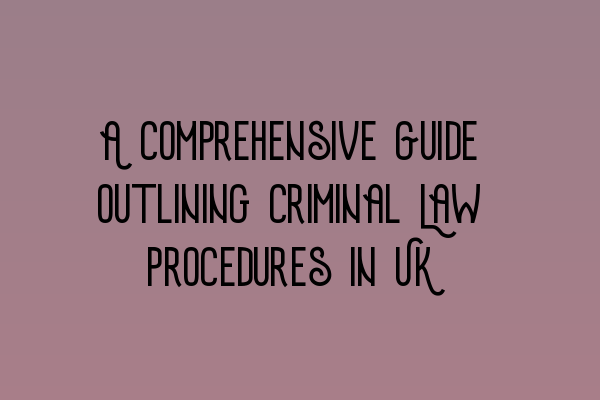A Comprehensive Guide outlining Criminal Law Procedures in the UK
Welcome to SQE Criminal Law & Practice Law UK! As a leading solicitor firm, we are committed to providing you with a comprehensive guide to understanding criminal law procedures in the UK. Whether you are a law student preparing for the SQE exams or an individual looking to enhance your legal knowledge, this guide will serve as a valuable resource.
Overview of Criminal Law Procedures
The criminal law procedures in the UK are a set of rules and regulations that govern the handling of criminal cases. These procedures ensure a fair and just legal process for all parties involved, including the accused, the victims, and the society as a whole. Understanding these procedures is essential for anyone involved in the criminal justice system.
1. SRA SQE Exam Dates: Before diving into the intricacies of criminal law procedures, it is important to familiarize yourself with the exam dates for the SRA SQE exams. These exams are a crucial step towards becoming a qualified solicitor in the UK.
2. Arrest and Detention: The first step in criminal law procedures is the arrest and detention of a suspect. The police have the authority to arrest individuals suspected of committing a crime, provided they have reasonable grounds to believe the person is guilty. Being aware of your rights during arrest and detention is crucial for safeguarding your interests.
3. SQE 1 Practice Exam Questions and SQE 1 Practice Mocks FLK1 FLK2: Once arrested, the suspect is entitled to certain rights, including the right to legal representation. It is highly recommended to practice SQE 1 exam questions and mocks to enhance your understanding of criminal law procedures.
4. Bail: After an arrest, an individual may be granted bail, allowing them to remain free until their trial. Understanding the conditions and requirements for bail is crucial as it can have a significant impact on the course of the case.
5. Investigation: Criminal law procedures involve a thorough investigation conducted by the police and other relevant authorities. This includes gathering evidence, interviewing witnesses, and analyzing forensic material. Understanding the investigation process is essential for building a strong defense or prosecuting a case effectively.
6. Charging Decision: Once the investigation is complete, the prosecuting authority will decide whether to charge the suspect with a criminal offense. This decision is based on the evidence gathered during the investigation and the public interest in prosecuting the case.
7. SQE 2 Preparation Courses: If you’re preparing for the SQE 2 exams, our comprehensive preparation courses will provide you with the necessary knowledge and skills to navigate criminal law procedures with confidence.
8. Court Proceedings: When a case goes to court, the prosecution and defense present their arguments and evidence before a judge and jury. Understanding the different stages of court proceedings, such as arraignment, trial, and sentencing, is crucial for effectively representing your client’s interests.
9. Appeals and Review: If a verdict is reached, parties involved in a criminal case have the right to appeal the decision or request a review. These processes allow for a thorough examination of the proceedings to ensure that justice has been served.
Conclusion
Understanding criminal law procedures is essential for anyone involved in the criminal justice system. Whether you’re a law student preparing for the SQE exams or an individual seeking legal knowledge, our comprehensive guide serves as a valuable resource. We invite you to explore our SQE 1 Preparation Courses and SQE 2 Preparation Courses to enhance your understanding of criminal law procedures and increase your chances of success in the legal profession.
